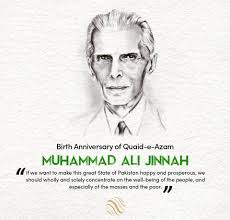Quaid-e-Azam Day, celebrated on December 25th, marks the birth anniversary of Muhammad Ali Jinnah, the founder of Pakistan. This day is a time to reflect on his vision, sacrifices, and the pivotal role he played in creating an independent homeland for Muslims of the subcontinent. It serves as a reminder of the principles he upheld and the responsibility of every Pakistani to honor his legacy.
Early Life and Education
Muhammad Ali Jinnah was born on December 25, 1876, in Karachi. Belonging to a merchant family, he displayed a sharp intellect and ambition from a young age. After completing his early education in Karachi and Bombay (now Mumbai), Jinnah pursued legal studies in England. He became the youngest Indian to be called to the bar at Lincoln’s Inn, a remarkable achievement for that era.
Jinnah’s exposure to Western education and legal systems profoundly influenced his political philosophy. He admired the principles of democracy, rule of law, and justice, which would later become the cornerstone of his political career.
The Evolution of a Leader
Initially, Jinnah was a member of the Indian National Congress (INC), advocating for Hindu-Muslim unity and self-rule under British colonialism. However, the rise of communal tensions and the lack of representation for Muslims within the INC led him to rethink his stance.
In 1913, Jinnah joined the All-India Muslim League, a platform that represented the political and social interests of Muslims. Over the next two decades, he emerged as a unifying figure for the Muslim community, tirelessly working to safeguard their rights.
The Vision for Pakistan
Jinnah’s vision for Pakistan was deeply rooted in his understanding of the socio-political realities of the Indian subcontinent. He believed in the idea of a separate state where Muslims could freely practice their religion, culture, and traditions without fear of oppression. His famous statement during the Lahore Resolution in 1940 encapsulates his vision:
“Muslims are a nation by any definition. They have their own religion, culture, and traditions. They have every right to a homeland of their own.”
For Jinnah, Pakistan was not merely a geographical entity but a beacon of hope for an oppressed community. He envisioned a state based on principles of justice, equality, and tolerance.
The Struggle for Independence
Jinnah’s journey to realizing the dream of Pakistan was fraught with challenges. Despite opposition from British authorities and Congress leaders, he demonstrated unparalleled perseverance and leadership. His strategic acumen, combined with his ability to inspire unity among Muslims, earned him the title “Quaid-e-Azam,” or “The Great Leader.”
Under his leadership, the demand for Pakistan gained momentum, culminating in the creation of an independent state on August 14, 1947. However, the partition of India came with significant human suffering, and Jinnah’s resolve was tested as he worked to stabilize the nascent nation.
The Principles of Quaid-e-Azam
Quaid-e-Azam’s speeches and writings reflect his unwavering commitment to core principles:
1. Unity
Jinnah emphasized the importance of national unity to overcome the challenges faced by Pakistan. He famously stated:
“We are now all Pakistanis, not Baloch, Pathans, Sindhis, Bengalis, Punjabis, and so on. And as Pakistanis, we must feel, behave, and act as one nation.”
2. Faith
Jinnah’s faith in the resilience and potential of the people of Pakistan was a cornerstone of his leadership. He believed in fostering confidence and self-reliance among the citizens.
3. Discipline
Discipline, for Jinnah, was essential for building a strong and prosperous nation. He urged Pakistanis to work diligently and uphold the rule of law.
Legacy and Relevance Today
Jinnah passed away on September 11, 1948, just over a year after Pakistan’s independence. Despite his untimely demise, his legacy continues to inspire generations. However, the vision of a tolerant, just, and progressive Pakistan remains a work in progress.
As Pakistan grapples with challenges like political instability, economic hardships, and social divides, Jinnah’s principles provide a guiding light. His emphasis on unity and justice reminds us of the need to rise above personal and political differences for the greater good of the nation.
How Pakistanis Celebrate Quaid-e-Azam Day
Quaid-e-Azam Day is observed with reverence across Pakistan. The day typically includes:
- Wreath-Laying Ceremonies: At Jinnah’s mausoleum in Karachi, government officials and citizens pay tribute by laying wreaths and offering prayers.
- Public Events: Schools, colleges, and organizations host debates, speeches, and seminars to educate young Pakistanis about Jinnah’s life and vision.
- Media Coverage: Documentaries, dramas, and interviews highlighting Jinnah’s achievements are broadcasted.
- Community Service: Many use the occasion to engage in charitable activities, reflecting Jinnah’s spirit of compassion.
Conclusion
Quaid-e-Azam Day is more than just a commemoration of Muhammad Ali Jinnah’s birth. It is an opportunity to reflect on his extraordinary contributions and recommit to the values he championed. By embodying his principles of unity, faith, and discipline, Pakistan can move closer to realizing the vision of a progressive, inclusive, and prosperous nation.
As Pakistanis, it is our duty to honor the legacy of Quaid-e-Azam by working together to build the Pakistan he dreamed of.


